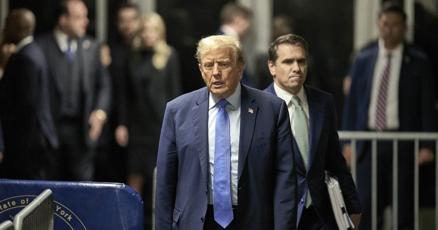In-Depth: The Legal Siege Entangling Former President Trump Over Alleged Hush Money Payments
Former President Donald Trump finds himself engulfed in a pivotal legal drama; this time, the focus is on payments made to Stormy Daniels and Karen McDougal during his 2016 campaign. Read further for a comprehensive account of the courtroom developments and their political reverberations.
Published May 01, 2024 - 00:05am

Image recovered from thestar.com
The legal maelstrom around former President Donald Trump has intensified as he faces allegations in a high stakes trial in New York. Central to the case are supposed hush money payments connected to Stormy Daniels and Karen McDougal and the subsequent legal maneuvers during his 2016 campaign. Testimonies in court are not just unraveling the secret dealings but also highlighting the involvement of key figures like Trump's former attorney Michael Cohen and the tactics employed by the defense to underscore Cohen's alleged unreliability as a witness.
The case touches upon the propriety of a $130,000 payment to Stormy Daniels through Essential Consultants LLC and an agreement involving Karen McDougal, with both women claiming affairs with Trump which he denies. The scrutiny is tied to the suggestion of record falsification by the former president's company to cover for these transactions.
Amid the proceedings, Trump was fined for contempt by Judge Merchan for multiple violations of a gag order, which barred him from making public statements about trial participants. With the potential of penalties escalating to jail time, the courtroom dynamics are charged with an air of unpredictability as the case unfolds.
Keith Davidson's pivotal testimony as former lawyer to Daniels and McDougal detailed the delicate balance between protecting his clients' interests and negotiating with media outlets. This nuanced insight came against the backdrop of Michael Cohen's own dealings with AMI over the controversial media 'catch-and-kill' practices. Davidson’s involvement is a thread that potentially ties Trump's campaign to a complicated narrative of scandal suppression.
As the trial unfolds, further witnesses and evidence that could shape perceptions of Trump’s candidacy and his methods of dealing with controversy are expected. The political ramifications loom large, with Trump's movement in the courtroom indicating the trial’s impact on his presidential campaign, just as it adds tension to the broader political landscape.
At the heart of the trial is the question of whether these transactions constitute violations of campaign finance laws. The payments, made in the lead-up to the 2016 election, could be considered illegal campaign contributions if they were intended to influence the election's outcome by preventing damaging stories from surfacing. Prosecutors are digging into the intent behind the payments, scouring emails, financial documents, and witness accounts to determine if there was a coordinated effort to protect Trump's image at a crucial time in his campaign.
The defense, on the other hand, argues that the payments were personal matters, not campaign expenses, and therefore outside the purview of the election laws in question. They insist that Trump's own finances were used to settle these matters privately, without the intention to skirt legal campaign reporting requirements. However, legal experts note that the personal nature of the payments does not necessarily exonerate the actions if they were, in fact, aimed at influencing the electoral process.
With the former president's extensive business empire under the microscope, the case has drawn attention to the Trump Organization's accounting practices. Allegations of doctored financial statements to suit various purposes, including obtaining loans, insurance benefits, and tax breaks, add complexity to the proceedings. The role of Trump's children and their involvement in the family business is also expected to come under scrutiny as the trial progresses.
Trump's supporters and legal team have repeatedly denounced the trial as politically motivated, characterizing it as a witch hunt by those who wish to ensure he doesn't hold office again. This narrative plays out in social media, where Trump's fervent base remains vocal in their criticism of the judicial process. Yet, some legal analysts suggest that the outcome of the trial could be a pivotal moment in American jurisprudence, establishing clearer boundaries for political actions during campaign periods.
The former president has faced multiple inquiries since leaving office, including ongoing investigations into his financial dealings, tax practices, and his role in the events leading up to the January 6th Capitol riot. Each case bears its own set of consequences that could potentially disqualify him from future political office or, less likely, lead to criminal charges.
As the New York trial garners national attention, it has become a spectacle not just for judicial observers but for a divided public pondering the implications for democracy and the rule of law. For many Americans, the trial reinforces the need for transparency and accountability in politics, while others see it as a continuation of the divisiveness that characterized Trump's term. In either case, the unfolding drama in the courtroom is adding another chapter to the already turbulent legacy of the 45th President of the United States.







